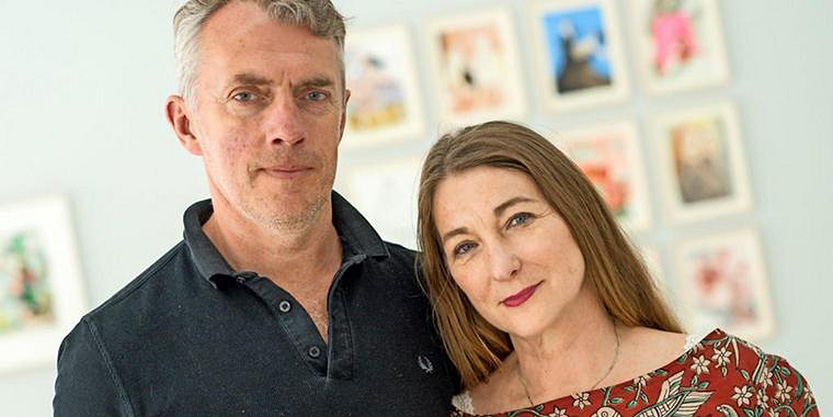You have been working on the stage design for "Lohengrin" for six years. How is it for you, now your concept, your stage design, your painting, your costumes in function to see in motion?
Neo Rauch: That's a surreal moment. When I attended a dress rehearsal for the first time, and a gentleman emerged from the backdrop I had sketched just before - to the precise physiognomy, I thought, that cannot be true. That was scary. I sit in the auditorium and find that my pictures are brought to life by adults in strange costumes, and this is done with sincerity. That touches me totally.
Rosa Loy: I am fascinated by the way Reinhard Traub deals with the light. He offers different possibilities - and then one can decide. That's like a Christmas present, a luxury.
What is the cooperation with Christian Thielemann?
NR: I talked to him about the concept. And we agreed that it must be romantic. And that fits in with my associations, which I linked early with "Lohengrin": a glowing evening sky and no modern escapades, nothing that would point anywhere in the direction of our current problem areas, at least not in a superficial sense.
RL: We had the idea to make it relatively traditional, with a round horizon. The technicians could not remember the last time that was done. Christian Thielemann was thrilled.
The stage design is reminiscent of Flemish painting of the 17th century, in the middle of the stage we see a surreal, abandoned substation. Lohengrin wears a suit that an electrician could wear in the 1930s, as you yourself suggested. Many figures have wings. In the background there are shadowy rocks, there is lightning. It is about light and dark. There is a lot of blue, water plays a role. There are marshes and reeds, creating an eerie as well as unclear mixed situation. How important is it for you not to eliminate these ambiguities in the stage design?
NR: As important as one should remain unclear when working on a picture. If you are too unambiguous, then you produce propaganda. It's always about ambivalence, always about both-and-also. Of course, that's difficult in an atmosphere where the either / or is back in full swing - whoever is not with us is against us and so on. We are representatives of the both-and-also principle. We like the traversing, the ambivalent, the no longer determinable. These are the reasons why the art feeds.
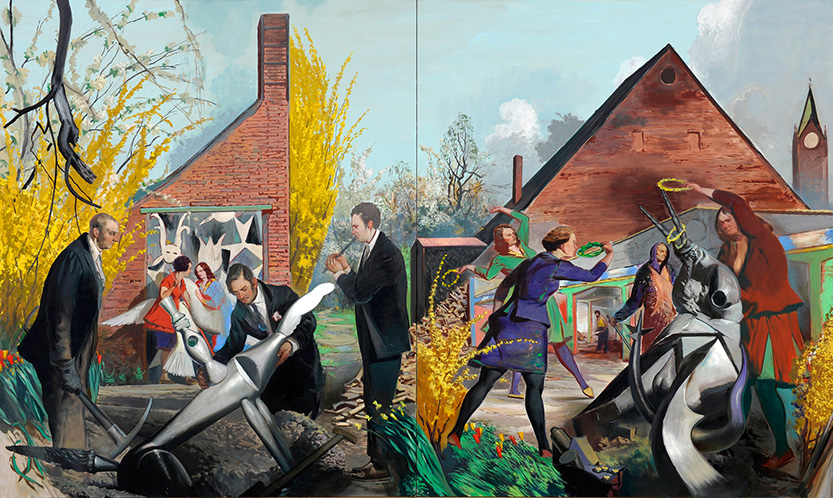
How is it for you to work in Bayreuth, where there are lurking abysses?
NR: We are aware that we work in a contaminated field. We all know what was here, that here the “Ungeist” (The Demon) went in and out. So, the artistic work here is also a kind of exorcism.
And if Lohengrin reminds you of an electrician from the 1930s, are these then possibly unconscious historical feedback?
NR: Of course. You have to leave your senses open to catch those particles of suspended matter rising from the reed belt - the swamp bubbles, the swamp gases, the goblins. That's the material we mainly use as a painter - not the news headlines. We are responsible for the intermediate roles, for the things we cannot find concepts for.
How did "Lohengrin" actually come to you, does Katharina Wagner call someone at one point, or how does that work?
RL: It was felt by a good friend of ours, who is in a Wagner club, and then there was direct contact.
What does the figure of Lohengrin stand for?
NR: He is the mysterious stranger who could also be the artist. An energy supplier that fails in the end.
RL: He has to prove himself in the effort of the level, and that's the problem. But it helps others develop. He is a catalyst.
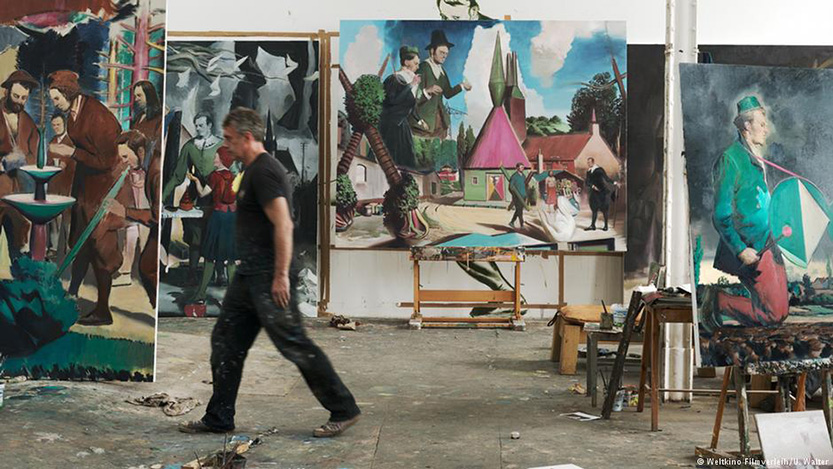
How has Lohengrin gotten into your head and studio since you knew you were going to get involved? From then on only Wagner left the plant?
NR: I have always heard Wagner. In any case, in recent years I mostly listen to classical music at work. Everything else is rather annoying, spreads counter-productive into the inspirational sphere. It is the subtle vibrations that the classical music sends out, on which the inspiration can reach me. So the transition was a fluent one.
Back to the "energy supply": How exhausted are you now?
RL: You're fully in those days, you have to be part of it from ten in the morning to ten in the morning. But you get back a lot of energy here. Here, everything interlocks, one takes each other consideration, wants to create something together. The people here think ahead, that gives a lot of energy.
NR: We also got involved to a degree that may not be so typical for stage designers, at least not for set designers who get into the action as newcomers. In the initial phase, in which I also had some reservations, I expressed my opinion to a colleague whom I knew had already made a set design, that I did not know. He said: Oh, that's easy. You design something, give it away, and they do it. And then you come sometime to the dress rehearsal. It may be that many do it, but that was out of the question for us from the start. If so, because, I said. Then we are also there from the first minute. In addition, every brushstroke must correspond to my intentions. Because this form of stage design, which is based on the classic backdrop principle, stands and falls with the painterly quality. It can mutate into the suburban stage-like if it's not well done.
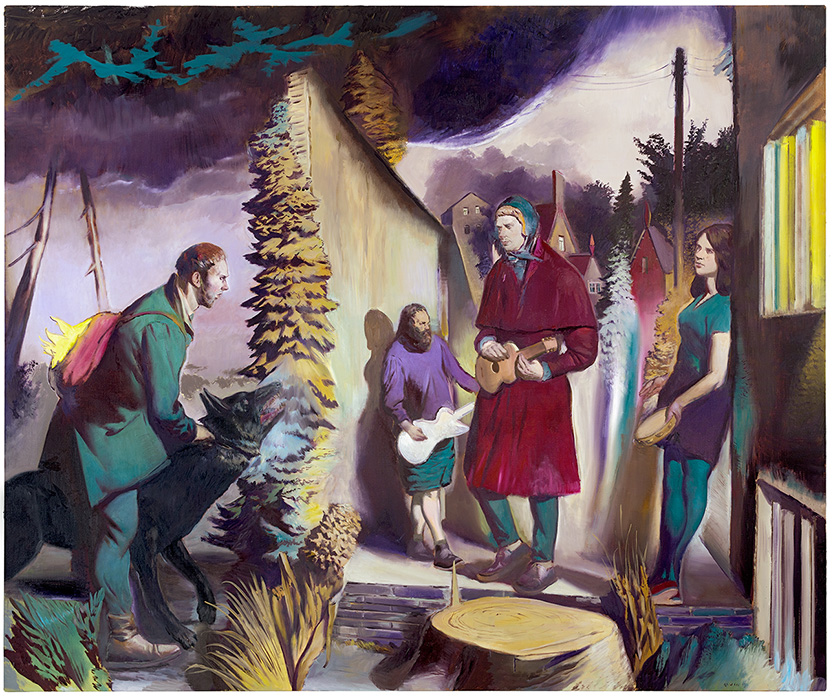
Where did the stage brochure actually come from?
RL: It was painted in Leipzig, in the theater workshops. Leipzig was the place where that was possible.
NR: The screen was about the size of a hockey field.
RL: Then you go up to a jetty and look down ...
It is said that your husband is suffering from vertigo.
RL: He just looked at the picture, and then everything was fine.
NR: Exactly.
In 2016, the Latvian Alvis Hermanis directed "Lohengrin". He had criticized, inter alia, Angela Merkel's refugee policy and was therefore even criticized. How did you perceive that?
NR: I found it very regrettable that he jumped. I told him, let's get through the shitstorm together. But he did not want to make us hostage to his overall situation, so we had to accept his withdrawal.
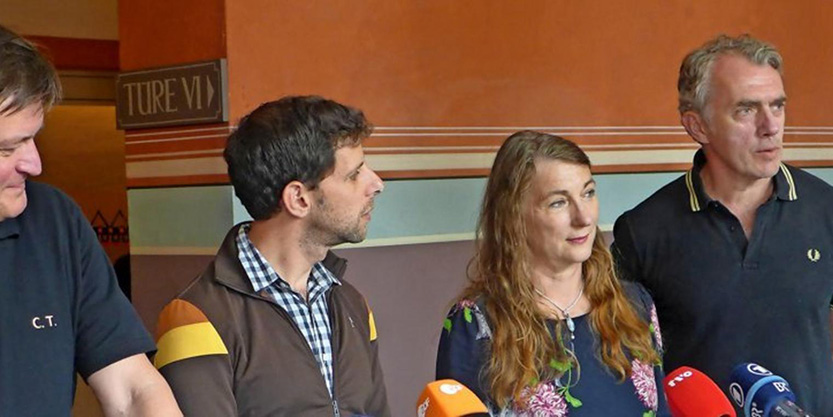
For him, the American Yuval Sharon has taken over. How was that, he had to adopt an advanced concept?
NR: A stroke of luck. He could have upset everything, but he did not. He switches and controls how he and we like it. He has apparently found a comfortable entry.
RL: He is so positive and optimistic. Even if he is totally exhausted in the evening, he is still open and has ideas. He has great ability to deal with large groups of people, he is very motivating for everyone.
NR: He has the Californian sun.
Was there actually a marital fight over the work on "Lohengrin?"
NR: no.
RL: It's all about pointing each other to mistakes, corrections. And you get more relaxed the older you are.
| Interview by Jürgen Kleindienst |
| Translated from the German by Vincent Vargas |
|
